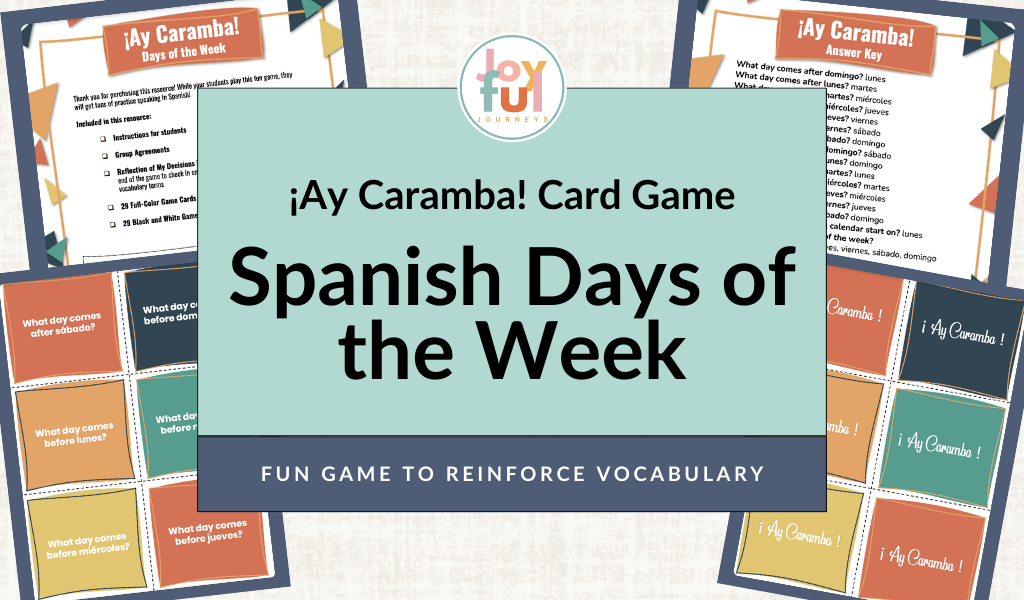Hey there, Joyful Journey Makers! Let’s talk about one of the most important (yet often feared) parts of learning—making mistakes. In language learning, mistakes aren’t something to avoid; they’re essential for growth. But why are mistakes so crucial? Neuroscience research shows that when students make mistakes, their brains are actively engaged, building stronger connections and deepening understanding. Let’s explore how mistakes drive learning, how to create a classroom where mistakes are celebrated, and introduce a fun way to practice through the “¡Ay Caramba!” Days of the Week Card Game.
The Neuroscience of Making Mistakes
Making mistakes is a critical part of how the brain learns. Here’s what the research tells us:
Creating a Classroom Where Mistakes Are Celebrated
Here’s how to create an environment where students feel comfortable making mistakes and learning from them:
- Normalize Mistakes: Let your students know that mistakes are a natural and essential part of learning a new language. By celebrating mistakes, you encourage students to take risks and experiment with the language without fear of failure.
- Encourage a Growth Mindset: Teach your students about the growth mindset—the idea that intelligence and skills can be developed through effort and perseverance. Emphasize that mistakes help them grow and become stronger language learners.
- Provide Gentle Corrections: When students make mistakes, offer gentle corrections that guide them to the right answer without discouraging them. For example, if a student says, “Hoy es lunes” when they meant “Hoy es martes”, simply respond with, “¡Casi! Hoy es martes.” This allows the student to learn without feeling embarrassed.
- Make Learning Fun: Incorporate games and playful activities that focus on using language in real-life contexts. Games take the pressure off and create a fun, supportive atmosphere where students can make mistakes without judgment.
Now that we know why riddles are effective, here are three easy ways to use them to practice Spanish vocabulary in your classroom:
- Warm-Up Riddles: Start your class with a daily or weekly riddle in Spanish. This sets a fun, lighthearted tone for the lesson and encourages students to think critically from the start. You can tie the riddles into whatever vocabulary or grammar you’re working on that week.
- Riddle Stations: Set up riddle stations around the classroom, with each station focusing on a different concept (such as days of the week, numbers, or colors). Students rotate through the stations, solving riddles as they go. This keeps the energy high and ensures that all students are actively engaged in the learning process.
- Riddle Relay Race: Divide the class into teams and have a riddle relay race! One team member must solve a riddle and say the answer out loud before tagging the next teammate to solve the next riddle. This adds an element of friendly competition and motivates students to practice their speaking skills.
Get Your FREE Resource: "¡Ay Caramba!" Days of the Week Card Game
One playful way to help students embrace making mistakes while practicing their Spanish is through the “¡Ay Caramba!” Days of the Week Card Game. This fun game focuses on days of the week vocabulary and provides a low-pressure, interactive way for students to practice speaking Spanish.
What’s Included:
- Full-Color and Black-and-White Game Cards: Students draw cards that ask questions about the days of the week, such as “¿Qué día es hoy?” (What day is today?) and “¿Qué día será mañana?” (What day is tomorrow?). They must answer in Spanish to keep the card.
- ¡Ay Caramba! Cards: These special cards add a fun twist! If a student draws an ¡Ay Caramba! card, they have to return all their cards to the pile, making mistakes part of the excitement.
- Reflection Exit Tickets: At the end of the game, students complete a reflection sheet, where they can review the vocabulary they mastered, identify areas they need to work on, and ask any questions they still have.
How to Use the ¡Ay Caramba! Card Game in Your Classroom
- Small Group Play: Split your students into small groups and give each group a set of ¡Ay Caramba! cards. Let them take turns drawing cards and answering questions about the days of the week. Encourage them to help each other if someone makes a mistake, fostering a supportive environment.
- Whole-Class Challenge: Use the game as a whole-class activity by selecting one student to read the questions aloud. The first student to answer correctly keeps the card. If a mistake is made, gently correct it and keep the game moving. The ¡Ay Caramba! cards keep things lighthearted and fun, even when mistakes are made.
- Wrap-Up with Reflection: After the game, hand out the reflection exit tickets to each student. Ask them to think about three vocabulary words they’ve mastered, two words they still need to work on, and one question they have. This reflection helps students process their learning and take ownership of their progress.
The Gist of it All
Making mistakes isn’t just okay—it’s a powerful tool for learning. When students feel free to make mistakes in a supportive, fun environment, their brains become more engaged, and they’re more likely to retain what they’ve learned. With activities like the ¡Ay Caramba! Days of the Week Card Game, you can create a classroom where mistakes are celebrated and every error becomes an opportunity for growth.

Resources
Overbye, K., Bøen, R., Huster, R. J., & Tamnes, C. K. (2020, June 16). Learning from mistakes: How does the brain handle errors?. Frontiers for Young Minds. https://kids.frontiersin.org/articles/10.3389/frym.2020.00080




